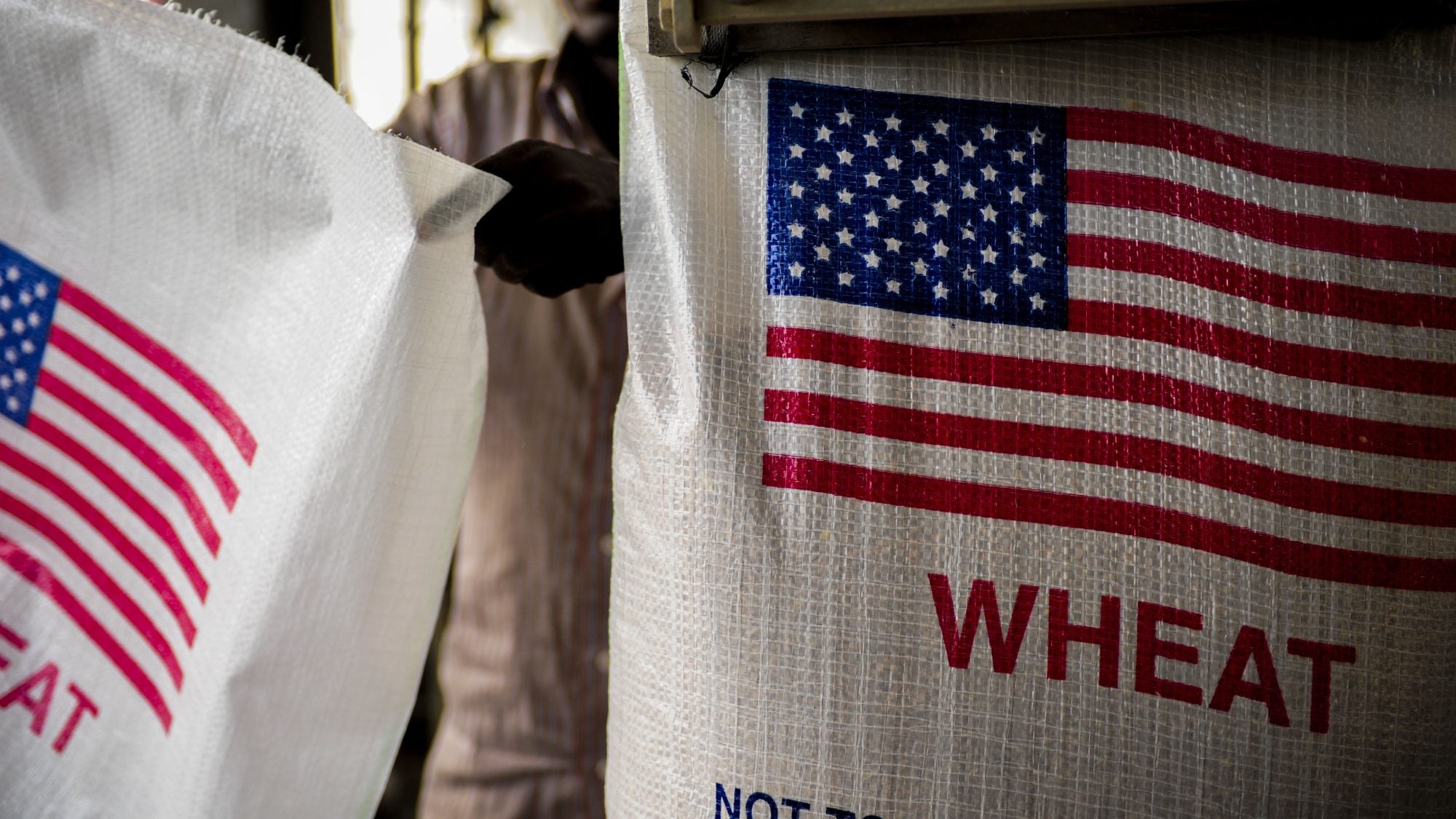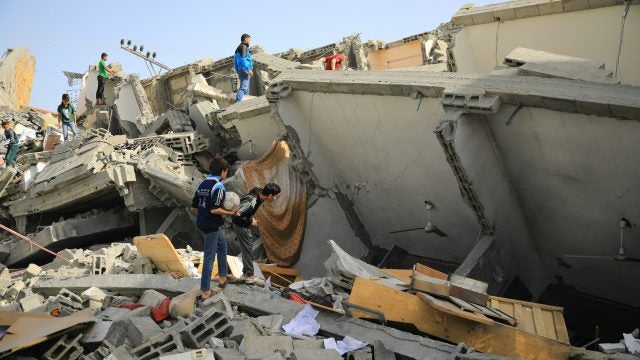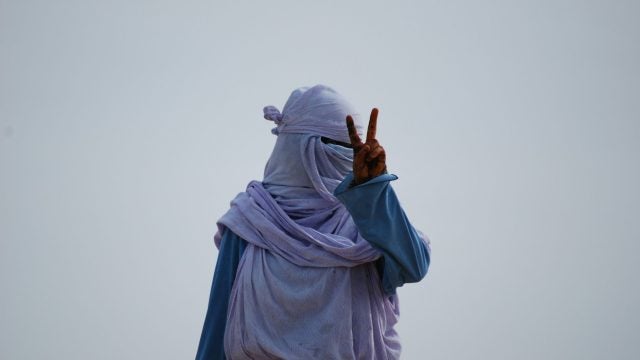
Title: Making Aid Work: Five Minutes with Former USAID Administrator Andrew Natsios
On February 22, former USAID Administrator Andrew Natsios sat down with Georgetown student Kenneth Anderson to discuss USAID priorities in a time of budget constraints, the ongoing famine in the Horn of Africa and his experience as a Georgetown professor.
[GJIA] How do you see US development policies changing in an era of budget cuts? What should USAID prioritize with more limited funding?
[AN] I think the experiment we did with the Global Development Alliance for public-private partnerships was successful. We tipped the scale at nine billion dollars for the program, 25 percent of which was US government money. The rest was private money. We have an alliance to improve water quality in Africa with Coca-Cola. We don’t give any money to Coca-Cola, they contribute to the projects voluntarily. We have big projects in the Niger Delta currently worth around $100 million. Most of that is from private sources. Chevron is one of our best partners in Nigeria, as well as Angola. In Angola we set up an agricultural bank for small farmers, and it’s been a huge success. It’s stimulating agricultural production. The people in Chevron love the USAID program, and we work with NGOs and contractors on the implementation side. So I think USAID should focus on developing far more public-private partnerships.
USAID also created a bunch of foundations and trusts around the world as we departed countries. We closed down the aid mission in Costa Rica because the country became too prosperous and didn’t need an aid program anymore. Instead we created a trust to address environmental issues, which has become one of the most respected national environmental NGOs, but most people don’t know that USAID created that trust. It’s a legacy of the American people to the Costa Rican people, something we should all be proud of. By creating legacy trusts and legacy foundations that can continue the work USAID began for years after we leave, we can contribute to the ongoing success of programs ten years after sending the last aid disbursement.
[GJIA] And these trusts are staffed and operated by the countries themselves?
[AN] The trust is entirely run by Costa Ricans. The US Embassy puts a couple of people on the board and may provide technical assistance, but the Costa Ricans control a majority of the board seats.
[GJIA] As an advisor for the Romney campaign, have you suggested these kinds of reforms to USAID?
[AN] I have. Governor Romney is very much interested in innovative approaches to spurring development in other countries. He recently said that soft power has to be one of our tools of foreign policy. I certainly agree with him on that.
[GJIA] What is the current status of the famine in the Horn of Africa? Why is this region so famine-prone, and what interventions do you believe could lead to a sustainable solution for long-term food security?
[AN] The famine in the Horn of Africa affects Eritrea, Ethiopia, Sudan, Kenya and Somalia, but the epicenter and most severe impact is in Somalia. There has been a significant population increase in Ethiopia. The country now has 80 million people, and as a result, the size of farm plots is shrinking for individual families. This makes it extremely difficult to produce any food surpluses. Ethiopia needs to industrialize, to diversify its economy and reduce overcrowding on the farms, which will increase farming efficiency. But that has yet happen. Periodic droughts in the countries of the Horn [of Africa] have been going on for a long time, compounding the problem.
To put it simply, more money needs to be invested in sustainable agriculture and developing the science and technology to make agriculture more productive and resistant to adverse weather conditions. This would help to protect against droughts and increase production so there are larger surpluses. Improved agricultural technology and practices must be combined with infrastructure investments to improve the roads that transport agricultural inputs and surplus. Until that’s done, we are going to keep seeing these kinds of emergencies.
[GJIA] What do you feel you get out of teaching here at Georgetown?
[AN] I’m under less stress than I’ve ever known in my professional career. And some of my fellow professors say, “Don’t you find it stressful to correct papers or to lecture?” And I tell them, “No, I don’t find it stressful. I find it stressful to have a US senator screaming at you on national television—that’s a little more stressful.”
I find it rewarding because I like the students. They’re very smart and career-oriented—which is a good thing. And despite what some people say, I don’t find the students to be cynical, whether graduate or undergraduate. A lot of them come back after they graduate and tell me what they’re doing now, and I can see that some of the things in the classes that I taught have had an influence in their careers. And that’s rewarding.
. . .
This interview was conducted by Kenneth Anderson, a second year student in the Masters of Science of Foreign Service program at Georgetown University and managing editor of the Business & Economics section of the Georgetown Journal. Gina Park, an editorial assistant for the Journal and junior at the School of Foreign Service, transcribed this interview.
Andrew S. Natsios served from 2001 to 2005 as Administrator of the US Agency for International Development (USAID) and was appointed as Special Coordinator for International Disaster Assistance and Special Humanitarian Coordinator for Sudan. He was the Special Envoy to Sudan, focusing specifically on Darfur, from 2006 until 2007. He managed USAID’s reconstruction programs in Afghanistan, Iraq and Sudan, which totaled more than $14 billion over four years. From April 2000 to March 2001 Natsios served as the CEO of Boston’s Big Dig, the largest construction project in American history, while he was Chairman of the Massachusetts Turnpike Authority. He took over the project after $2.4 billion in undisclosed cost over runs were discovered.
Image Credit: Airman 1st Class Nicholas Byers, Public domain, via Wikimedia Commons
This is an archived article. While every effort is made to conserve hyperlinks and information, GJIA’s archived content sources online content between 2011 – 2019 which may no longer be accessible or correct.
Recommended Articles

This article analyses the distortions of the International Humanitarian Law (IHL) notion of proportionality in the context of the Israel-Gaza war. It discusses Israel’s attempts to reinterpret proportionality to justify…

The escalating women’s rights crisis in Afghanistan demonstrates a gap in international legal protections of the rights of women and girls. The international community should fill this gap by making…

This article situates Bangladeshi and Global South feminist praxis, a process by which theory is realized into action, within broader critiques of international law by Third World Approaches to International…